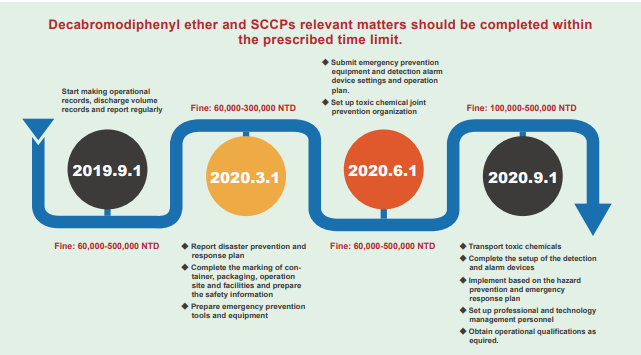- Date:2019-04-20
- Department:Chemicals Administration Ministry of Environment
In response to the new items added to the Stockholm Convention, the EPA announced on 6 March 2019, short-chain chlorinated paraffins (SCCPs) to be listed as Class 1 toxic chemical substances. The EPA also relisted decabromobiphenyl ether from currently listed control chemical substances as a Class 1 and Class 2 toxic chemical substance. In addition, the EPA now bans all use of hexachloro-1,3-butadiene in order to keep up with the latest international control trends.
The EPA explained that SCCPs, decabromobiphenyl ether, and hexachloro-1,3-butadiene are three persistent organic pollutants (POPs). POPs are substances that are slow to decompose in nature or have a long metabolic half-life inside a living organism, therefore posing dangers to human health and the ecosystem. The three substances have been put on Annex A (elimination) of the Stockholm Convention. Through the Convention, the United Nations (UN) requires signatory nations to ban the use or restrict the production of POPs unless the substance obtains a registration from the UN to be used for special purposes.
The EPA stated that SCCPs are primarily used as an additive and a plasticizer to manufacture conveyor belts in the natural and synthetic rubber industry. Decabromobiphenyl ether is widely used in brominated flame retardant to inhibit burning of organic compounds and often used to manufacture electronics, clothes, and furniture in order to lower products’ flammability. Hexachloro-1, 3-butadiene is commonly found in solvents used in making elastic objects as well as heat-transferring liquids.
The EPA has already initiated an investigation into the domestic industrial uses of the abovementioned substances. SCCPs are the byproducts of chlorinated paraffin manufacturing and are primarily used in research, experiments, and education. Decabromobiphenyl ether has already been gradually eliminated internationally. As such, Taiwan is also reducing the usage of this substance. The investigation into hexachloro-1,3-butadiene has found it to have no other purposes beyond research, experimentation and education. Given this, the tightened control on hexachloro-1,3-butadiene will only have a marginal effect on Taiwan’s industries.
The EPA emphasized that, after the announcement, enterprises transporting, manufacturing, importing, selling, using, storing, or handling the three substances should apply for approval and operate according to relevant regulations. The purpose is to track the flow of these chemical substances.

Source: EPA Major Environmental Policies, April 2019



